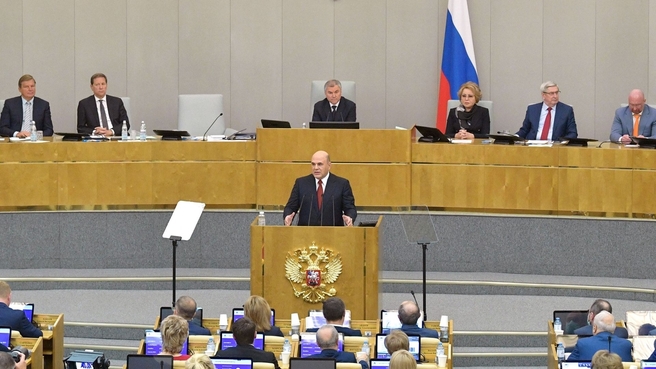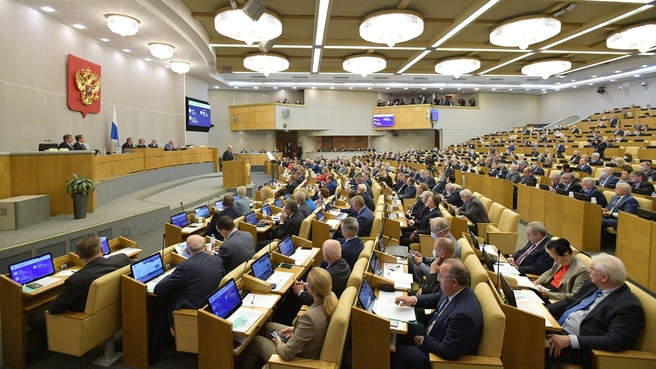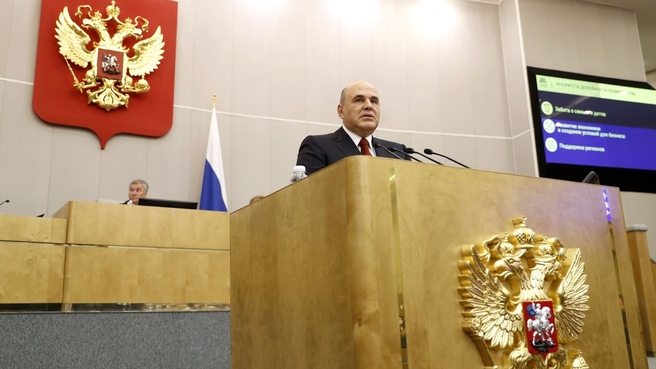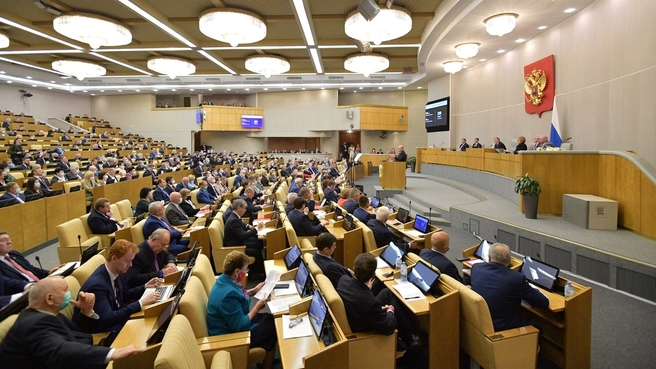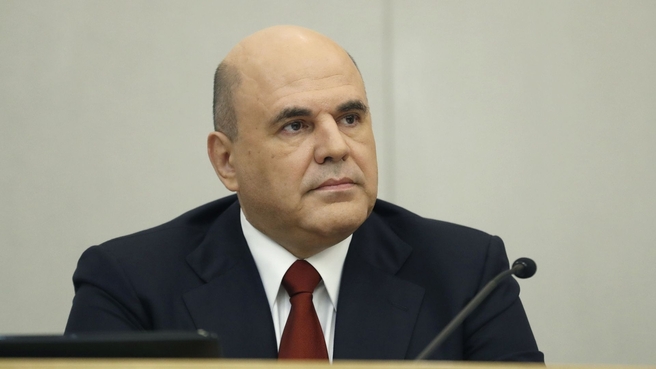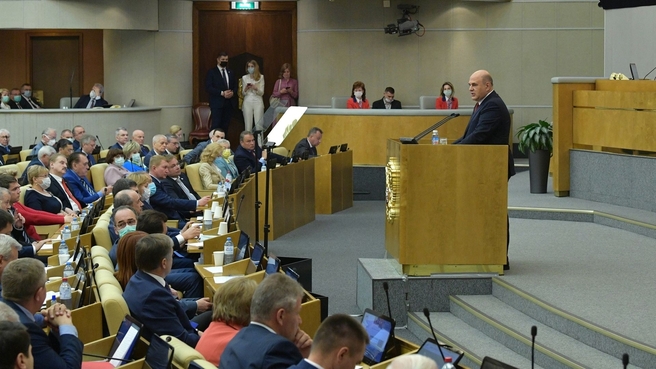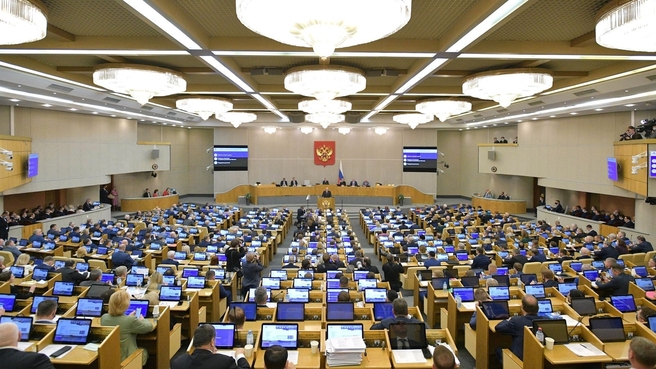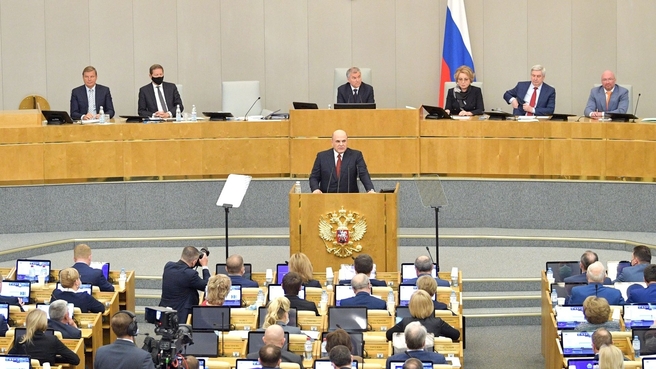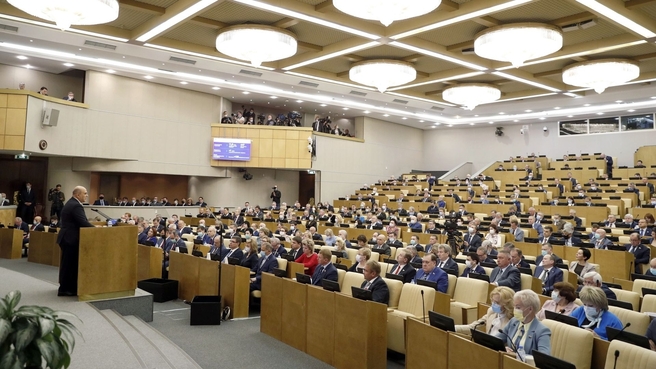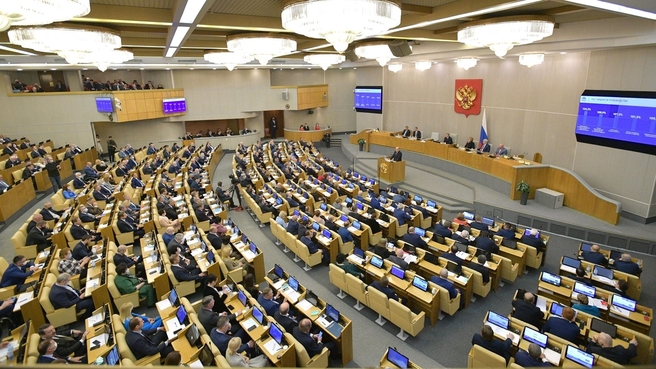“The Government of the Russian Federation <…> shall submit to the State Duma annual reports on the Government’s performance, including on issues formulated by the State Duma.” (Constitution of the Russian Federation, Article 114, Clause 1, Subclause “a”).
Mikhail Mishustin: Mr Volodin, Ms Matviyenko, deputies of the State Duma, colleagues,
Today I am presenting an annual report on the results of the Government’s performance in 2020 to the State Duma.
In his Address to the Federal Assembly delivered on 15 January 2020, the President presented a new large-scale programme of social support. He also proposed formalising social guarantees at the constitutional level and making amendments to the Constitution to enhance the efficiency of these efforts at all levels of power.
The President outlined our priorities. They include taking care of families and children, developing the economy and creating conditions for business, and supporting the regions as a prerequisite for the country’s development. We hoped to be able to achieve considerable results in all these spheres in a very short time.
However, we had to address the implementation of the tasks set by the President in extremely difficult conditions. Nobody could have imagined that the threat posed by the new infection would be so serious throughout the world. Millions of lives were put in danger. To save them and to prevent the worst case scenarios, the Government adopted a number of emergency measures in accordance with the President’s instructions. This called for a new speed of decision-making and an almost 24/7 operation. We had to act as quickly as possible.
The pandemic forced us to revise high-priority aspects of our work, with due consideration for what was really going on and the emerging threats, so as to unconditionally accomplish presidential tasks under far from easy conditions. First of all, this concerns the efforts to save the lives and health of our people. Quite often, it took us 24 hours to make decisions regarding the battle with the COVID-19 pandemic. We boosted considerably assistance for the healthcare system and supported the economy.
We managed to avoid introducing tough restrictive measures during the pandemic’s upsurge in the autumn of 2020 and this spring.
It goes without saying that this would be impossible without the heroic work of our people. The entire country rallied, and this helped us slow down the spread of the coronavirus. Today, I would like to sincerely thank everyone for this, including those who worked in red zones 24 hours a day, who helped senior citizens and everyone who displayed restraint and willpower.
At the moment the situation is gradually improving, although it is still too early to talk about a complete recovery. This year should turn the tide and facilitate our victory over the infection. This is our common responsibility and common work that continues unabated and does not stop even for a minute.
Colleagues, I would now like to sincerely thank you for your active work and professionalism that you displayed during this hard period of time. First of all, I would like to say thank you for the support, provided by the parliament when it became necessary to take urgent action to protect the lives and health of millions of people.
The year 2020 showed how the entire public administration system should operate. We managed to create an unprecedented cooperation mechanism for providing legislative support to measures being adopted and for quickly implementing them under the budgetary process. This mechanism has proved effective and should certainly be preserved.
Importantly, we managed to elevate cooperation between legislative and executive branches to an entirely new level, and we also worked together to implement key provisions of the President’s address.
I would like to note separately how we drafted anti-crisis measures for supporting the people, medicine, businesses and the economy at the height of the pandemic. All of them were speedily drafted. The Government submitted over 300 highly important federal bills that you approved. In effect, we established a mechanism of effective feedback between the people and the state, which the President repeatedly spoke about. We also introduced new forms of control and responsibility for the adopted decisions and, most importantly for the quality of implementing them.
The most important aspect of the Government’s work was prompt execution of decisions. We excluded the possibility of extending the deadlines. During the most difficult period, we introduced the practice of immediate adoption of regulations needed to combat the coronavirus infection.
To manage the deadlines, an information system was created to monitor the implementation of our key objectives. We monitor the performance discipline 24/7.
On the President’s instructions, the Government took a number of emergency measures against the infection and rallied all resources available. We worked proactively to prevent an explosive growth in the number of new cases and immediately began to mobilise the healthcare system and industry.
Our scientists quickly developed effective test systems to diagnose this new virus that was little-known at the time. The scale of testing increased every month. Hospitals across the country deployed additional beds for coronavirus patients. Over the year, the number of such beds increased more than five-fold. More than 40 new hospitals were built for infectious diseases.
However, we must admit that not everything went smoothly at once. A number of regions had difficult situations. When we just started the coronavirus response effort and during peak periods, we experienced disruptions in medication supply. People began stockpiling drugs for future use because they did not believe they would be able to buy the medicines they needed if they contracted the virus. But we were able to correct that situation, quickly bringing to the market 12 basic antiviral drugs and a vaccine of domestic production. To achieve that, we simplified the procedures for registering drugs, test systems and personal protective equipment. It is important that now the supplies are being delivered to hospitals, clinics and pharmacies on time, so we will renew their registrations. This will require changes to legislation. I ask you, colleagues, to support this initiative.
Russian specialists have already registered four vaccines. I should point out that this was made possible thanks to the teamwork of our researchers, industry and state. Our country today is a leading biotechnological power and the problems in this field can only be solved by six countries in the world. Each of our domestic-made vaccines is safe and effective. Sputnik V has passed tough trials, won trust and has been registered in 65 countries already. There is an enormous demand for this preparation. We are helping to arrange its production abroad as well and also exporting it to 34 countries.
Of course, our citizens come first. After the President issued an instruction, voluntary and free mass vaccinating started all over the country at the end of last year. More than 24 million people have already had the different jab stages. We need to build up collective immunity by the close of the year.
It is of upmost importance that people get their jabs even faster. As a man who contracted this disease I want once again to press upon everybody to get vaccinated. Above all I’m referring to senior citizens who are especially vulnerable to the coronavirus. Please do take care of yourselves and your kith and kin.
During the period of time when the coronavirus was spreading we were active in introducing digital technologies into the healthcare system. This included e-sick leaves as well as access to PCR-test results and internet registration for getting jabs. We have gained the first successful experience of using AI for viewing medical scans. We have started to introduce telemedical consultations between doctors in different locations within our country. After the President issued an instruction we launched a coronavirus hotline. People can make a doctor’s appointment, arrange a home visit and also get any necessary advice.
We automatically issued sick leave to those in the risk group, the 65+ people. We increased the basis for calculating it, so that now it cannot be below the minimum wage. This allowed us to ensure the minimum level of sick leave payments for working people regardless of their length of service.
Acting on the President’s initiative, we adopted incentive and special social payments for those on the frontline of the battle against the coronavirus – not only for the doctors, but also for the paramedics and nurses, ambulance drivers and the other groups of personnel at hospitals and outpatient clinics who received coronavirus patients, as well as for social workers. In all, such payments were issued last year to over half a million medical workers and nearly 73,000 social workers. We allocated approximately 200 billion roubles for this purpose. Regrettably, not all the intended recipients across the country received these funds immediately. But we promptly launched feedback services for medical workers via the government services portal so that we could quickly deal with each case and promptly take decisions to remedy the situation. It was important for us to protect the rights of every one of those who were saving lives.
Today we are marking International Nurses Day in Russia. I would like to convey our best regards to all members of this difficult profession which all of us need so much. I would like to once again thank all those who are taking care of our health and who are helping people at this difficult period. We are grateful to them for their dedication.
It is very important now to draw conclusions from the pandemic and to learn lessons so that we can prevent a repetition of this situation in the future. We have started creating a reliable shield to give us sanitary safety, which the President mentioned in his address.
Colleagues, I would like to thank you for supporting the Government’s draft law On Biological Security. It provides a legal framework for deploying this system.
We are paying considerable attention to the development of the sanitary-epidemiological and infectious diseases services. The Government is working to reduce the risk of dangerous infections in Russia to a minimum. We have the wherewithal to do this, first of all, top-notch researchers and a solid scientific background. The Pasteur Institute is working in St Petersburg, the Research Institute Microbe in Saratov and, of course, the Vektor State Research Centre in Novosibirsk, which I have visited recently. We need this Sanitary Shield to protect everyone in our country.
The Government adopted a series of anti-crisis measures to mitigate the consequences of the outbreak. We tried to act in a targeted manner and support people as much as possible, help businesses, primarily to preserve jobs, and reduce costs. We focused on helping those who were hardest hit by the pandemic.
The lockdowns and restrictions led to a decrease in economic activity and as a result, to constraints on the employment market, which slashed people’s incomes.
We tried to give people as much support as possible, both the working and the temporarily unemployed, and families with children. I will cite just one figure now: the Government allocated more than 2.5 trillion roubles for additional support measures. Is this a lot of money or not? For comparison, it accounts for more than 10% of the country’s annual budget.
But this is not just about how much money we spent; it is equally important how timely and targeted that assistance was, and consequently, how effective. In the context of the pandemic, we supported every second family in Russia with direct payments. These families have over 28 million children.
They also include more than 2 million people who had lost their jobs and had young children – they received some additional money to supplement their unemployment benefits. At that time, there were more than 3.5 million children in these families.
We also focused on making the procedures for getting state support as simple and convenient as possible, without additional paperwork or visits to various agencies. Those entitled to support should be able to apply at the gosuslugi.ru government services website. We eventually solved this problem. Last year, the support payments to families with children in June and December were provided through that portal. Overall, 56 million people used government services through the website, almost twice as many as a year earlier.
We also supported workers who had lost their jobs by increasing unemployment benefits for more than 2.3 million people, including self-employed individuals and sole business owners. We extended the welfare period for those who were entitled to unemployment benefits until March 2020. By supporting businesses, we helped keep millions of people on board. Under the President’s decision last spring, entrepreneurs were provided with grants to continue paying wages in the amount of one minimum wage per employee.
In order to ensure the prompt provision of business support measures, the Federal Tax Service launched a special digital platform in just 17 days. More than 1 million small and medium-sized enterprises, which employed about 4 million people, received grants worth more than 90 billion roubles through that platform.
We launched programmes stipulating loan support for the most affected sectors. The FOT 2.0 preferential lending programme was the most ambitious scheme, aiming to write off all debts if any specific company retained at least 90 percent of its workforce. Companies retaining at least 80 percent of their staff had 50 percent of their debts written off. This programme involved about 230,000 companies. Its implementation will make it possible to write off about 430 billion roubles’ worth of corporate debt. Most importantly, these decisions made it possible to retain about 5.5 million jobs.
We launched the FOT 3.0 programme in March, and it will also help retain jobs. Contracts worth 45 billion roubles have been signed under this programme, helping support up to 1.2 million people. This past March, we also launched a programme of employment incentives. We started subsidising those employers who will provide jobs to all officially unemployed persons, as of 1 January 2021. They will receive three minimum wages stage by stage after becoming full-time workers. In our opinion, this measure will help over 200,000 people find jobs.
We have also launched other business support measures. The state shouldered most of the financial burden, including wages and personal protective equipment subsidies. The Government used a wide range of economic tools. Companies were allowed to defer insurance, tax and lease payments. Insurance premiums for small and medium-sized businesses were halved, and soft loan programmes were introduced.
Last year, entrepreneurs saved about 300 billion roubles through the reduction of insurance premiums. They saved another 100 billion roubles through taxes and insurance premiums being written off for the second quarter. This allowed companies to spend substantial resources on wages and development.
First of all, we supported companies directly cooperating with people and providing services. They had drastically curtailed their business operations due to the lockdown-related restrictions. Small and medium-sized entrepreneurs were particularly badly hit.
Naturally, we did not focus on them alone. We also helped self-employed persons. This format stipulating minimal taxes and minimal interaction with the state became highly popular. Although the year proved extremely difficult, the number of self-employed persons exceeded two million people (over 2.3 million).
This shows that people believed the state and left the shadow economy. And we supported them and fully reimbursed their 2019 tax payments. You remember this presidential initiative, and this totals almost 1.5 billion roubles.
We provided tax capital of almost 20 billion roubles to pay the tax in the amount of the minimum wage.
We hope that this experience will seriously motivate those still working inside the shadow economy.
Special measures were also offered to backbone enterprises. We stipulated soft loans for them. First of all, these loans aimed to retain jobs and to augment their working capital. We were able to help businesses employing almost one million people.
We subsidised airlines and railway companies, cruise companies and cultural agencies. Over 100 national airports received financial assistance.
In addition, the Government launched a package of measures to simplify the business environment. The deadlines of over a million licences, permits, certificates and other mandatory documents were automatically extended.
Actually, the year 2020 heralded changes in the area of control and oversight. Over 11,000 legal acts, mostly Soviet-era documents, were abolished under the regulatory guillotine.
The law on mandatory requirements that was passed last year sets forth the procedure for stipulating and enforcing new regulatory norms. This allows people and businesses to prepare for changes well in advance. Every six years, we will assess the efficiency of this mechanism.
Comfortable and predictable conditions for doing business also depend on the regulatory system. Prevention instead of inspections is the new principle of the regulatory authorities based on a risk-oriented approach. With this aim in view, we have joined forces with our lawmakers to adopt a relevant law, created a mechanism of pre-trial complaints against decisions and now we are gradually transitioning to electronic communications.
Last year we simplified the signing of annual state contracts so as to be able to maintain the volume of government procurement and postponed the introduction of new rules for vehicle owners, from technical maintenance standards to the transportation of hazardous cargo. We also adopted a number of other decisions.
Thanks to the combined efforts of the regional and federal authorities, we have maintained economic stability and, consequently, helped keep people in jobs at the majority of enterprises.
Despite the problems we encountered, the country has retained its positions on the international markets and even increased exports. For example, we have boosted the export of services in the IT sector by over 6.5 percent. The use of the tax manoeuvre in this sector allowed us to create comfortable conditions for doing business and manufacturing new products, as well as for attracting and hanging onto skilled professionals in Russia.
We have practically halved insurance contributions for companies that market, create and implement software, and reduced the income tax for those concerned to just 3 percent. These conditions also apply to the designers of micro- and radio-electronic products.
The Russian software designers who implement their own solutions are not required to pay VAT. Unprecedented tax incentives are being offered in Russia for the designers of software and electronic equipment. Over 2,500 new Russian IT companies are using these incentives, and the number of products in the register of Russian-made software has increased by more than one-third.
There is a huge demand for competent professionals in this particular sector. In accordance with the President’s instructions, our universities have increased enrolment for digital economy professions by 12,000 state-financed places, after almost doubling them during the previous two years.
We provided support to universities and research institutes in light of the coronavirus restrictions, spending in total almost 21 billion roubles for this purpose.
To have a solid school of higher education, we need to create a scientific background and, of course, a comfortable environment for life, study and participation in interesting research projects. Last year, we allocated over 13 billion roubles for the renewal of equipment. Grants have been issued to over 200 organisations, including – for the first time – universities.
We have begun to update universities’ facilities and equipment, carrying out major repairs, including of dormitories. About 18 billion roubles were allocated for these purposes. Most of the funds went to the regions. Almost 400 universities in 82 regions received support.
We have not been neglecting fundamental research. Major scientific and infrastructure projects, primarily what is called megascience, continued to be implemented full-time. I am referring to the NICA collider facility in Dubna and the Siberian Circular Photon Source in Novosibirsk. I have personally visited both sites. The high-flux PIK research nuclear reactor was also launched in the Leningrad Region.
Each of these facilities is a complex technological structure and is comparable with the “nuclear project” in terms of the scale of investment, the complexity of the problems to be solved, and the depth of its potential long-term influence on the respective technological niches.
Reviving the labour market is of the essence today. The Government, along with the regions, has developed appropriate packages of measures for each constituent entity of the Russian Federation. In 17 regions, employment has already returned to pre-COVID levels.
We need a modern approach to human resource management. We have already prepared and agreed on a law on teleworking, expanded the opportunities for working outside the office environment, and established a procedure for the temporary transfer of employees to the so-called telecommuting.
Let me underscore that improving the system for promoting employment has been a joint effort. The unified digital employment platform bill sponsored by Valentina Matviyenko and Vyacheslav Volodin is extremely important.
All specialised services will be connected to the Work in Russia portal; methodological requirements and supervision of their observance will also be unified.
Employment centres are expected to provide opportunities for remote job search, including proactive services, along with in-person appointments. On the whole, the innovations proposed will help develop a single, open and transparent labour market and create the necessary conditions for reducing unemployment.
This applies to all industries, including culture-related ones. During the pandemic, public and private institutions in this area needed special support. And we did provide it. This helped maintain the salary levels of cultural workers. And most importantly, they continued their work. With state support, they were able to move most of their projects online as quickly as possible, initiate new ones, and make plans for the future. The industry has managed to get through this difficult period.
I would like to specifically point out that our theatres, museums and other cultural facilities across Russia have reopened after a short period, with due account of all the safety requirements and precautions.
Many Russians have not been able to go on foreign vacations this year. On the President’s instruction, the Government launched a programme to compensate tourists for part of their costs (they use the term cashback for this, but I prefer the Russian term) if they travel in Russia and use the MIR card. By the beginning of May, almost 1 million people had taken advantage of this offer and received reimbursements totalling about 4 billion roubles. That also channelled additional funds to the regions. I have personally spoken with many representatives of the tourism business – in Karelia, in Altai, and in Kamchatka and they said the programme was very popular. The Government has extended it until the end of this year.
We have also approved a national project aimed at developing domestic tourism for our people to travel around Russia inexpensively and comfortably. We really hope that this will help the regions to create jobs in various sectors, such as the service industry and hotel business, and also preserve unique historical and cultural landmarks, health centres and resorts, encourage investment in new projects in this sphere and attract foreign visitors to Russia.
I would like to emphasise that in line with the President’s instructions, the Government has also helped socially-oriented noncommercial organisations. Their work deserves great respect. Together with the regions and the Presidential Grants Foundation, we have supported more than 33,000 such organisations.
While countering the pandemic and its consequences, we were doing our regular work. We have been creating ways to upgrade entire sectors and public services based on innovations and digital solutions.
Significant changes took place in the social sphere. Now the Government is introducing elements of “social treasury” step by step. I would like to elaborate on this. This means that people will be able to receive help from the state not because they asked for it but because they have the right to do this. It will be as simple as issuing a maternity capital certificate, for example. Let me just say this, that it is not issued via an application on the website, but automatically after the registration of a birth at a registry office.
In line with the President’s instructions, we have prolonged and expanded the maternity capital programme. Now it is available when the first child is born. Last year, over one million families received such certificates.
The minimum amount of childcare allowance for babies under 18 months old also increased by 100 percent. Moreover, when children are born in a family in need, special payments equal to the minimum subsistence level are assigned until the children are three years old. We have over 1.5 million such families.
In line with the President’s instructions, we have launched another programme to support families with children, the largest over recent years. We have begun to provide benefits for children aged three to seven years old living in low-income families. Last year, these benefits were issued to over 4.5 million children. Now we have improved the procedure of granting these allowances to make the help more tailored, and the amount of payment may be 50, 75 or 100 percent of the minimum subsistence level for a child depending on a family’s situation.
We will continue to develop the system of social contracts for low-income families. They get help to overcome a difficult everyday situation, and people can get help from the state not only with finding a job or improving qualifications, but also with starting a business, as well as with running a personal subsidiary farm. More than 100,000 such contracts were signed last year. We have significantly expanded their capabilities, and from this year on this support measure is available in all the Russian regions.
We hope that over a period of the next three years almost 400,000 families will be able to increase their income using this mechanism, and at least 300,000 people will start their own businesses, register as individual entrepreneurs or self-employed.
We have also tried to simplify the provision of services to people with reduced capabilities. Now they do not need to go anywhere to establish or extend their disability status. It has been settled through a temporary regulation. Over two million people have made use of it. We are reforming the medical and social assessment system so that in the future these procedures are as convenient as possible for people.
Now about the new mechanisms of support, which at the President’s instruction are being put into effect as soon as this year. The amendments to the law providing for the implementation of the presidential address have already been made by Valentina Matviyenko and Vyacheslav Volodin.
We have started and will continue to support parents while their child is growing up. Mothers-to-be will also receive aid. From 1 July special monthly payments will be made to women who registered during early pregnancy and who are in a difficult financial situation. The payments will amount to an average of 6,300 roubles countrywide. And child care sick leave will be payable until the child reaches the age of seven, inclusive, in the amount of 100 percent of average earnings.
We will also support low-income single parents, who are bringing up a child on their own. From 1 July about 5,600 roubles on the average will be paid to such families with children aged between eight and 16.
In August, in accord with the President’s instructions we will make lump-sum payments to families with schoolchildren and future first-graders. We will pay 10,000 roubles per child.
And this year parents will be able to save half of the cost of sending their children to a summer camp. It is not long until the school holidays and for this reason the Government will launch such a programme as early as this month.
All that I have said above is about our priorities in social policy. And we will fulfil all our obligations.
Now, about the real economy, of course, the pandemic has resulted in changes here as well. For objective reasons the industrial growth rates simply could not remain at the previous year’s level. However, thanks to the coordinated work by the regions, federal agencies and industrialists themselves, we have managed to avoid a critical recession.
The industry responded quickly to the greater demand for personal protective equipment, antiseptics and everything that is so necessary during a pandemic. We could deploy industrial facilities fast enough practically in the manual mode. Now we are able to produce 15 times more masks, 33 times more protective overalls, 40 times more medical gloves, 24 times more ventilators, and eight times more antiseptics than the year before. The Fund of Industrial Development alone supported over 100 anti-COVID projects. We know of some cases where companies promptly repurposed their production. Garment manufacturers started turning out personal protective equipment, others – antiseptics, and we know of many such cases.
Despite the hard circumstances, companies continued to start production. We can see this in St Petersburg, where a new producer is now providing the whole country with antiviral medicine.
Our manufacturing industry has suffered significantly, less though from the crisis caused by the coronavirus pandemic than in Europe. In April, the entire European industry hadn’t seen such low performance for the past 25 years. In our country, this decline did not exceed 8 percent, and by June it had halved. At the same time, by the end of the year, we not only overcame the decline but also reached 2019 levels.
A number of industries showed steady growth last year. Among the undisputed leaders are the production of medicine and medical goods, as well as the production of textiles and the chemical industry.
Thus, over 55 billion roubles were allocated to support the automotive industry. This helped to support the sales of almost 300,000 vehicles and mitigate the forecasted decline in this particular sector.
We also paid special attention to promising areas, primarily the development of the electronics industry. This is the basis for building the foundation of the digital transformation of our country. We have multiplied budgetary funding for the industry, and plan to allocate almost 280 billion roubles for its development in the three-year budget. We have to ensure a full-scale transition to domestic hardware and software systems, on which major services for the people, the government and businesses will be based.
We also re-launched the programme of co-financing of regional industrial development programmes, which is in great demand. Over 14 billion roubles were allocated to agricultural engineering. This allowed farmers to purchase almost 30,000 units of machinery and equipment. The agro-industrial complex also confirmed the record growth rates for the year. We had a good harvest of grain and oilseeds; the production of meat and milk went up, more greenhouse vegetables and fruit were grown, thanks in part to the considerable state support not only under the state programme for the development of agriculture, but also due to the prolongation and delay of loan payments for the agribusiness.
The pandemic has become a major challenge for the construction industry. In some of the regions, there was a real threat of bankruptcy of many developers and the appearance of new defrauded equity holders. But in the end, over 80 million square metres of housing were commissioned last year. This is a figure comparable to that of the year 2019. I would just like to point out that for the first time in modern history, the construction industry survived an economic crisis without hardly any losses. This mainly happened thanks to a breakthrough in regulations. Over the past year, we significantly simplified construction procedures; by the end of the spring session, we plan to reduce them by about a third. The second thing is, we developed mortgage programmes. This is a preferential mortgage for new residential buildings at a rate of 6.5 percent per annum. Using it, more than 470,000 people managed to buy flats on favourable terms.
This programme will be ending in the middle of this year. Following the President’s instructions, the Government is considering the scope and format of its continuation. About 45,000 families took soft loans at a rate of up to 3 percent to buy housing in rural areas. Thousands of families managed to improve their living conditions thanks to the Far Eastern Mortgage programme. I met with the programme participants, in particular in Blagoveshchensk. They like it very much and think that the programme works well.
There are success stories in industry as well. Despite all the limitations last year, the most important projects were implemented in all the key industries. The largest non-nuclear icebreaker, Viktor Chernomyrdin, was launched; the nuclear icebreaker Arktika was put into operation – I visited Murmansk for the icebreaker’s commissioning ceremony. It relies on truly amazing technology. Also, the MC-21 medium-range aircraft made its first flight with a domestically made engine.
Once again, we have seen how vulnerable production chains can be when a disruption in the supply of one important part halts the entire technological process. For example, our vaccines cannot be produced if there is a shortage of even the smallest component. This remains true even though we are steadily expanding import substitution in various segments of our industry, primarily in manufacturing. The share of domestic products in these segments grew impressively last year to about 60 percent.
Now we are creating new tools for the expansion of the production of critical materials and components, putting together our own component base in order to reduce dependence on imported supplies.
We are making new import substitution plans consistent with the emerging challenges; we are prioritising them, focusing on components, and expanding bottlenecks. For example, in agricultural machinery we are focusing on modern types of transmissions; in pharmaceuticals, on specific substances indispensable for the production of medications; and in equipment engineering, on numerical control systems and guides. We expect to approve our updated plans by mid-summer, but we are actually already implementing them.
Last year, we launched an updated Special Investment Contracts (SPIC) mechanism. The list of modern technologies that can be financed via SPIC includes over 600 items. Tenders have already been announced for those projects, for example, technologies that can be used to make new types of agricultural tractors; the first contracts will be signed as early as next month.
Our import substitution effort has given us a solid reserve for the future. It is important to alter Russian industry structurally. And of course, we will strengthen support for our flagship industries, where one new job can create seven to eight additional jobs in related sectors, including aircraft and shipbuilding, and transport engineering.
We plan to begin commercial production of competitive types of transport – the medium-haul MS-21, the light-engine Baikal aircraft and the Il-114-300 regional aircraft. We will build new icebreakers and river-sea class vessels. We are introducing high-capacity turbines to ensure the strategic security of our energy sector. We also plan to develop the production of power storage systems based on powerful batteries.
While taking action to support the people and the economy, we had to consider the specifics of all Russian regions and their needs. We had to understand how all this worked at regional level. I visited almost one-third of Russian regions. Despite the COVID-19 pandemic, members of the Government and myself visited virtually every region of the country and assessed their development and problems.
We analysed the situation through direct dialogue with the people and the business community, with all those who were concerned about the future of their regions and country, rather than through written notes. People speak their mind and suggest various initiatives. Many ideas and proposals, voiced at such meetings, form the basis of our future decisions. This is a very important feedback mechanism that has been mentioned by our President. We issued over 300 instructions following our business trips. Most of them have already been carried out, and we monitor their implementation almost every day.
I would like to note once again that no reports can replace in-person communication, and we will certainly continue this practice. In his address, the President noted that the country was moving forwards only when its regions were developing. It is important to find growth points for every region, to improve the regions’ investment climate and to make them more competitive. And we are conducting this systemic work.
With you, we jointly passed legislative amendments that lifted many budgetary process restrictions in the regions during the pandemic. We provided direct financial assistance and offset shortfalls in the revenue of regional budgets.
I would like to single out the main aspects of support for the regions.
First, we have to reduce the debt burden on the budgets. Repayment deadlines were deferred for virtually the entire volume of restructured debt, as regards budgetary loans. This was carried out to accumulate resources in order to prevent the spread of the COVID-19 pandemic. And the short-term treasury loans maturity will be extended 2.5-fold, from 90 to 240 days. As per the President’s instruction, we will restructure budgetary loans, issued last year. In effect, they will become long-term loans.
Second, commercial loans will be replaced by budgetary loans, as the President has noted in his Federal Assembly Address, so that the regions can develop and finance high-priority expenditure. Market debts of regions and municipalities exceeding 25 percent of tax and non-tax revenues will be replaced with budgetary loans having the same long-tern maturity.
Third, the regions will be able to receive at least 500 billion roubles in the form of 15-year and low-interest infrastructure budgetary loans. This is a highly important aspect. First of all, we will issue them to territories that have implemented more well-thought-out debt policies.
Infrastructure bonds are another tool, and they will make it possible to attract additional extra-budgetary funding into the housing construction sector, and they will help finance construction of engineering, transport and social facilities. The Government will conduct all preparatory work for drafting the regulatory framework as quickly as possible.
I would like to mention one more important thing. The State Duma and the Federation Council have already suggested several times now that the report on budget execution for the past year should be moved to the spring session. I support this proposal and suggest going even further: to move the deadline for presenting the next three-year budget from 1 October to 15 September. This would help the regions prepare their budgets and would speed up the inking of agreements and contracts.
The President’s instructions on support for the regions call for amending the budget legislation. I will issue instructions on submitting a draft law to this effect to the State Duma over a period of the next few days. I would like to ask you to support this proposal.
Now, I would like to say a few words about the individual development programmes of the regions. Last year, the Government launched, together with you, measures to support 10 regions where the economic situation is especially complicated. I believe it is extremely important that the Government managed to adopt individual programmes for each of these regions without having to curtail support by a single kopeck despite all the problems we encountered. As much as 50 billion roubles have been earmarked for this particular purpose. These funds are being invested into practical things such as increasing people’s incomes, lifting infrastructure restrictions and helping small and medium-sized enterprises.
Incidentally, we can already report the first results of these individual programmes. Hundreds of new jobs have been created and dozens of investment projects worth nearly 14 billion roubles have been launched. Here’s an example. A children’s outpatient clinic and a medical centre have opened in Adygheya. Subsidies have been provided to agricultural companies in Mari El, which they have invested in development. The Government has allocated funds to Kalmykia, which has a shortage of drinking water, for a technical inspection of the water supply system. The problem of supplying people with water in that region must be settled as soon as possible. This is the most painful matter, and we spent most of our time discussing it during a visit there. In the Republic of Altai, we have approved allocations for the construction of purification facilities in order to reduce the negative impact on Lake Teletskoye. A natural gem of the republic.
I would like to point out that we do not introduce hands-on management in these regions. Our goal is to help them and to support their initiatives aimed at improving the life of the people. A great deal depends on the responsible attitude and activity of the local leadership. We will be closely monitoring them to ensure that they fully honour their obligations to the people.
Other constituent entities of the Russian Federation have problems as well, and these problems must be settled. Construction and reconstruction is underway at 48 facilities. All told these projects are worth more than 45 billion roubles. They include educational establishments the Republic of Tyva and the Magadan and Yaroslavl Regions, healthcare facilities, including the construction of hospitals in Kamchatka and the Kostroma Region and cancer clinics in the Kurgan and Magadan Regions, doing up a maternity home in the Novgorod Region, and the construction of an ice rink in Novosibirsk, to name just a few projects. Other facilities include airports, namely Tolmachevo airport [in Novosibirsk] and the expansion of the port infrastructure in Petropavlovsk-Kamchatsky.
The other sites on the map whose development is unthinkable without state support are rural areas in nearly every region. We have at our disposal a large number of economic tools for providing comprehensive support to them. We are also helping them within the framework of a state programme. Last year alone, this allowed us to improve the living conditions of over 6 million people. We have built houses and roads, created and renovated recreation centres, schools, medical centres and other social facilities.
I would like to point out that the development of rural areas remains a priority. We have approved this form of support in nearly all state programmes in all spheres, including in education, healthcare and social assistance. This year alone, we have earmarked over 220 billion roubles for the development of rural areas. In September, when the Government will submit its draft budget for the next three years, you will see that this subject remains at the top in absolutely all of our programmes.
Favourable development conditions must be created everywhere throughout the country. This is more difficult to do for objective reasons in some regions. A special approach must be adopted for them due to their geopolitical location. I am referring above all to the Far East and the Arctic. For example, in the Murmansk Region we discussed the development of transport corridors, the Northern Sea Route and the region as a whole.
At the end of March, the Government adopted a state programme for the development of the Arctic. Over the next three years, we will allocate about 15 billion roubles for its implementation, including 3.5 billion this year. The programme aims to ensure the region’s sustainable development, to attract investors and create new jobs there.
Quality of life and comfort largely depends on the state of the environment – on what kind of air we breathe and what kind of water we drink. We understand how important this is.
We drew some serious conclusions after the major accident at the thermal power plant in Norilsk. The guilty parties are going to meet the expense of clearing up the damage caused by the accident. But those companies should not be able to treat those payments as operating expenses – this would reduce their profits, and accordingly the taxes they pay to regional coffers. If they did that, it would mean that in effect, the damage would be cleared up at the expense of ordinary taxpayers. This is not right. These companies must pay for the damage from their net profits. This way their owners and top officials will bear responsibility. On a broader scale, entrepreneurs must change their attitude towards nature. On the President’s instructions, we will prepare and send for your consideration a draft law that will make the owners responsible for eliminating the damage they cause, financially, too. Business should work on the clean-up-after-yourself principle.
People want to live in a clean environment. We have all the tools to achieve this goal efficiently.
We definitely need to address a number of lingering problems, including abandoned hazardous facilities that pose a threat to the environment. We need to pinpoint all these places – sunken ships, old wells, and illegal dumps. We need to give the country a general cleaning. We are already working on this.
We are also going to develop a circular economy, stimulate businesses to stop making products that cannot be recycled, and generally reduce unnecessary packaging. For products that absolutely require packaging, it must be recyclable. The share of eco-packaging should be gradually increased to exceed 85 percent by the beginning of the next decade.
Another important task for this period is to halve the annual volume of waste disposal. We need to know exactly who is dumping household waste and where in order to exclude the very possibility of illegal dumps.
Russia’s development requires access to new markets, an influx of workforce, and expansion of foreign economic cooperation. This requires, among other things, further consolidation of the Eurasian Economic Union. Last year was a serious test for our association, but the common market withstood the blows of the pandemic.
The contraction of internal trade within the EAEU was not as serious as with third countries thanks to the well-coordinated work with our EAEU partners. We developed a joint action plan to combat the pandemic and took urgent measures to saturate the domestic market with the necessary goods.
Moreover, we agreed on shared conceptual approaches for the future. Last December, the heads of our states adopted a strategy for development of the union over the next five years. We will continue to ensure the free movement of goods, services, capital and workforce in our common market. All this creates new opportunities for doing business, for increasing the economy’s investment appeal and high-tech exports.
The steps we have taken to protect the economy have mitigated the impact of the coronavirus. True, a slight slowdown was inevitable in this situation, but given the new circumstances and the continuing negative external background, it was quite moderate – GDP shrank by no more than 3 percent. In March, according to the Ministry of Economic Development, Russia’s GDP exceeded the pre-COVID level for the first time and the economy is generally recovering.
The pandemic has increased the risks in global macroeconomic stability. The public and private sectors have accumulated debt, which was largely brought about by the fact that major industrial countries implemented long-term soft monetary policies. Low interest rates and printing money not covered by goods whipped up global inflation and boosted food prices.
Many companies that did not want to lose profitability raised domestic prices following worldwide patterns. Imported inflation became a negative aspect of our successes in expanding the country’s export potential, including agro-industrial exports. Domestic prices, primarily those for socially important goods, therefore, increased. The Government used a flexible approach: we used economic tools to curb prices for socially important foods.
We introduced long-term compensation mechanisms that reduce the dependence of domestic prices on global prices for some foods. Today, we are repaying this export duty to producers in the form of subsidies instead of directly channeling it into the federal budget.
We supported flour, bread and sugar producers, as well as other agricultural businesses that supply the domestic market, and we allocated an additional 15 billion roubles for this purpose.
Of course, none of us is completely satisfied with the result of the price-curbing measures. But for the adopted measures, we would have to discuss high and uncontrollable inflation rather than efficiency.
We would like our producers to profit from exports. However, they should not do this to the detriment of their main customers living and working in Russia.
It is important to mention another factor that contributes to price hikes, that is, the greed of certain producers and retail chains. In this connection, I would like to remind everyone that the Government has enough tools for suppressing the appetites of profiteers due to roaring demand in all spheres.
Petrol prices is another issue that worries people. No matter how difficult 2020 was, fuel price hikes did not exceed inflation levels at that time, and we will continue to monitor the situation using the tools at our disposal, including legislative tools.
Here is another global challenge that we cannot ignore. It is related to climate change and low-carbon development issues.
Over 60 states have already announced their intention to convert to carbon neutrality. A carbon tax is being levied in 25 countries. All this reduces long-term demand for oil and coal, our traditional exports. We see this as an extremely serious challenge, and of course, we also see it as an opportunity.
Reducing emissions is a strong incentive to rebuild the economy and advance new technologies in the field of energy, transport, and industry. This will increase the demand for greenhouse gas absorption projects, including reforestation. Colleagues, we have already discussed this.
The government has submitted a bill on limiting greenhouse gas emissions to the State Duma. We are to take a series of steps for the transition of industries and regions to low-carbon practices. This is a very difficult path.
As part of the climate agenda, it is fundamentally important to create our own accounting system for emissions and the removal of greenhouse gases. This system must have a scientific rationale and, importantly, be recognised throughout the world. For the purpose of this, we are creating the so-called carbon test areas in the Russian regions. We will continue this job.
Last year, as we rolled out our coronavirus relief effort, we also worked on building the groundwork for post-COVID recovery. We joined forces to develop a National Action Plan to promote employment and recovery of incomes, economic growth and long-term structural change. That Action Plan combined two important goals, namely to adapt to what is currently going on and to promote the further development of our country. As a result, the Russian economy is to embark on a growth trajectory. We are working vigorously to implement this plan and have, as of now, completed more than half of the steps.
However, all the achievements we are referring to here would be impossible without National Projects – Healthcare, Demography, Science and Universities, Education and others.
Last year, the President clarified the national development goals giving the Government a broader planning horizon and specific long-term targets. Measurable indicators have been established for each goal, while at the same time ensuring continuity with the previously identified priorities. We have increased the efficiency of the National Projects’ implementation. At the end of last year, we updated their content in coherence with the national development targets outlined by the President, and created an information system for monitoring and analysing their progress.
Thanks to these efforts, Russia now has schools that can accommodate more than 60,000 new pupils, new rural health points, outpatient clinics, children's hospitals and cancer centres. More than 40,000 of socially significant facilities have been connected to the internet. Residents have been relocated from dilapidated housing ahead of schedule. Last year, almost 130,000 people received new housing.
I will mention a number of other results from the national projects. The authorities have created conditions for children to achieve additional quality education. Forty-eight regions have established increased capacity for over 350,000 students at new and existing institutions. Over a million children visit youth and mobile technology parks and Quantoriums. The authorities have established 11 regional centres for identifying, supporting and developing the abilities and talents of our children and young people with due account of the experience of the Talent and Success Educational Foundation.
We drafted a unified plan for reaching our national goals to improve the coordination of the ministries and departments and fulfil more precisely this presidential plan. This is the first large strategic document that will merge the July executive order and national projects into an integral whole. In effect, it answers three major questions: When, where and what steps the Government intends to take to reach these goals.
All executive government bodies took part in preparing the plan. It was discussed with the representatives of the Federal Assembly, the Public Chamber, the Russian Popular Front (ONF), business and expert communities, and State Council working groups. They thoroughly analysed ways to reach our goals, specifying deadlines, checkpoints and financial support.
The unified plan has targets and deadlines in each region of the Russian Federation. It is important for people to know and understand when and what results they will see, not just nationally but also in every specific region or field.
We declared 2021 the Year of Science and Technology in this country. We must make thorough adjustments in the entire scientific area for it to produce specific results. Following Presidential instructions, we will allocate over 1.5 trillion roubles from the federal budget for fundamental research.
We will update our approach to managing and funding science significantly. The process from developing an advanced technology to a final introduction will become much shorter. The state will act as a contractor in this regard, primarily, in critical areas. One of our priorities will be to strengthen and build up the potential of the network of modern universities throughout the country.
We will continue improving the system of higher education by enhancing the role of universities in national socio-economic, scientific and technological development. The Priority-2030 Programme for the support of universities has already been drafted. It will be endorsed and launched before the end of May. The goal is to promote research, education, development, innovation, technology and all territories. At least a hundred universities, selected by a competition committee, will take part. It will involve sectoral medical, transport, agrarian, pedagogical and arts regional universities, to name a few.
I will speak separately about education. A modern school is not just about classrooms and desks. It implies good equipment, and access to the internet, the school network and e-resources. We must have schools like this all over the country. We will substantially expedite their construction. The President emphasised in his Address that by 2025, we must have at least 1,300 new education institutions, and in this case, third shifts will become outdated.
Every child must be able to get to school comfortably and safely. In four years, we will buy at least 16,000 new buses for the municipalities in need.
Recently, I visited the Altai Territory and talked to teachers there. Yulia Skorykh, a young teacher, told me there is no internet in a rural school where she works. None at all. Residents have established it themselves in some buildings, but the school has no access to the internet or any other e-resources.
This is also the case in some other regions. So in addition to global issues, we must resolve no less important specific tasks – to provide every town and village, all hospitals, outpatient clinics and schools with access to the internet and other communications.
We need to realise that today access to the internet is a must, just like heating or electricity. Last year, over 23,000 facilities, including first aid stations and schools in outlying areas, received internet access. All socially important facilities will have it before the end of the year. This is our plan and we will work to this end.
In addition, this year we will complete internet connections to all smaller residential settlements with populations of 250-500. People in over 12,000 small settlements are already on broadband internet. We will supply these communities with the mobile internet and communications. Last year, you supported the adoption of the government law on providing internet access to over 10,000 residential communities with between 100 to 250 people. In the next few years, we will supply all these villages with mobile internet and cellular service.
Last year has shown us a lot about how the government system needs to operate. Decisions had to be made at a different pace, almost around the clock. Meanwhile, the Government structure has remained almost the same for many years and could not help us fulfil our tasks in a new reality in those conditions. The Government drafted optimal solutions and uniform standards for the organisational management model.
Esteemed Mr Volodin and Ms Tereshkova, you have repeatedly emphasised the need to audit development institutions. We have done this. We have started reforming the structure and the activities to orient them more precisely to the national goals and to remove the overlapping points they had with federal government bodies and commercial companies.
We have done this to increase the efficiency of every development institution as much as possible by uniting their resources and efforts in common processes. Development institutions must provide tangible support for the nationally important projects – from the social area to the creation of new branches and resetting the investment cycle.
In view of our strategic agenda, we reset the control system by introducing new instruments to enhance the cooperation of ministries and departments, regions and the expert community. We established a coordination centre and are using its resources to search for ways to identify the most effective and quick solutions, primarily for implementing priority tasks and projects as determined by the President. Importantly, the centre helps us collect feedback from the public.
Our goal is to build a state free of red tape, a state that will not be burdensome for people and business and in which they do not have to ask for services. Government bodies will produce everything pro-actively. People will not have to waste time on collecting references and paper documents. The main goal is to make interacting with government bodies as convenient as possible for both the public and for companies.
Dear colleagues,
Last year we endured very serious trials. Now that the spread of the coronavirus has stabilised we must do all we can for people to return to a normal life as soon as possible. Reporting on the Government’s performance last year, I spoke about the values that guide us. They remain immune to change for us: focus on the people and their interests; work openly and honestly in a team spirit; and strive to produce results that are always, under any circumstances, more important than departmental borders and excessive formalities. I believe this approach has largely become the decisive factor in changing the situation for the better.
The past year has produced not only serious lessons but also experience that is helpful in the most complicated and sometimes unpredictable circumstances. During this difficult year, we focused on priority tasks, and simultaneously, the groundwork for a post-COVID breakthrough. Now we have every opportunity for this.
We have adjusted mechanisms for the interaction of government bodies and feedback from the people. The President has emphasised more than once that feedback, in-depth analysis based on primary statistics and professional expertise, are very important for Government decision-making. Now we can set more ambitious goals and, most importantly, comprehensively resolve the problems that are worrying people and are vital for national development.
The draft budget that we will submit for your review in the autumn, will contain the required parameters for implementing the major socioeconomic initiatives the President set in his Address. They will allow us to improve life for our people and enhance the national economy. We are all working for these goals regardless of our position or political view. I am sure we will achieve success.
Thank you for your attention.
